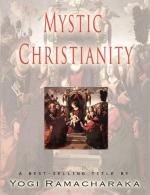And still on and on He pressed, until at last He mounted the steep sides of the barren forbidding mountain of Quarantana, beyond which He felt that His struggle was to begin. No food was to be found—He must fight the battle unaided by the material sustenance that ordinary men find necessary for life and strength. And still He had not received the answer to the cry of His soul. The rocks beneath His feet—the blue sky above His head—the lofty peaks of Moab and Gilead in the distance—gave no answer to the fierce insistent desire for the answer to the Riddle of the Voice. The answer must come from Within, and from Himself only. And in the Heart of the Wilderness He must remain, without food, without shelter, without human companionship, until the Answer came. And as it was with the Master, so is it with the follower—all who attain the point of unfoldment at which the Answer is alone possible, must experience that awful feeling of “aloneness” and spiritual hunger, and frightful remoteness from all that the world values, before the Answer comes from Within—from the Holy of Holies of the Spirit.
* * * * *
To realize the nature of the spiritual struggle that awaited Jesus in the Wilderness—that struggle that would bring Him face to face with His own soul, we must understand the Jewish longing and expectation of the Messiah. The Messianic traditions had taken a strong hold upon the minds of the Jewish people, and it needed but the spark of a strong personality to set all Israel into a blaze which would burn fiercely and destroy the foreign influences which have smothered the national spirit. The idea of a Messiah springing from the loins of David, and coming to take His rightful place as the King of the Jews, was imbedded in the heart of every Jew worthy of the name. Israel was oppressed by its conquerors, and made subject to a foreign yoke, but when the Messiah would come to deliver Israel, every Jew would arise to drive out the foreign invaders and conquerors—the yoke of Rome would be thrown off, and Israel would once more take its place among the nations of the earth.
Jesus knew full well the fact of this national hope. It had been installed into His mind from childhood. He had pondered over it often during the time of His wanderings and sojourn in foreign lands. The occult legends, however, make no mention of His having ever thought of Himself as the Messiah until he was about to re-enter His own land after His years of foreign study and ministry. It is thought that the idea of His being the long expected Messiah was first suggested by some of the Essenic teachers, when He rested with them for awhile before appearing before John the Baptist. It was pointed out to Him that the marvelous events surrounding His birth indicated that He was a marked individual destined to play an important part in the history of the World. Then why was it not reasonable to believe that that role was to be that of the Messiah come to sit on the throne of His father David, and destined to bring Israel from her now obscure position to once more shine as a bright star in the firmament of nations? Why was it not reasonable that He was to lead the Chosen People to their own?




